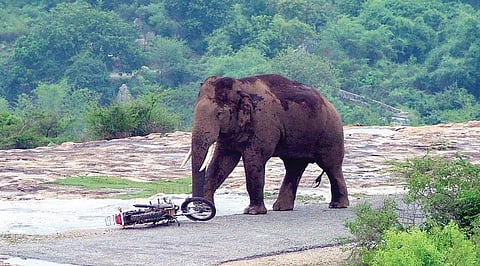

BENGALURU: The ‘Operation elephant capture’ kicked off on Monday with 100 forest personnel from Nelamangala and Magadi forest ranges launching combing operations in the area.
With increasing man-elephant conflict, and two elephants being electrocuted in the last two days, the operation to capture three male elephants in Nelamangala forest range of Bengaluru Rural division began after the Chief Wildlife Warden granted permission to capture one adult and two sub-adults. These male tuskers are part of a group of eight that roam around four forest divisions.
Five trained Dasara elephants from K Guddi, Nagarhole and Kushalnagar camps too are assisting in the operations.
Also, the operation involves catching tuskers which are suspected to have killed two people.
Manjunath, Deputy Conservator of Forests, Ramanagara, who is the nodal officer, told Express, “The elephants have been identified and the operations started at 7am in and around Nelamangala forest range. It is difficult to say when they will be captured as they go back and forth in these regions.”
Earlier, forest officials of the four divisions had identified a group of eight male elephants that had been moving from Bannerghatta to Tumakuru in search of food and water. Straying from corridors to non-traditional paths, this group raided many horticultural fields in villages.
In the last two days, two elephants were electrocuted - a 15-year-old tusker in Srigiripura village, Magadi taluk, and a 40-year-old tusker in Madegowdanadoddi village in Kanakapura taluk. However, whether they were a part of this group is not confirmed.
Officials said with this group coming in close contact with farmers, the conflict situation has increased. In the process, farmers have connected their solar fencing to power cables from nearby high tension power lines, resulting in electrocution.
4 dead in just 18 days
Wildlife conservationists are concerned as in just 18 days, four elephants, including Sidda, died in Nelamangala, Magadi and Periyapatna.
N Manjunath, founder-president of Nature and Wildlife Conservation Committee, says unchecked development around Bannerghatta National Park has driven away these animals towards other areas for food.
“Food is a major reason for elephants moving towards Magadi or Nelamangala. However, in the long run, it is not good for their health,” he said.
“With human beings intruding into elephant corridors and destroying their habitat, how can you blame the elephants for crop damage or conflict situations and remove them from a particular area,” asked wildlife activist Ashok Hallur.
The story of Ranga
The tusker Ranga has been spotted in Savandurga forests. For eight months, he is either in Magadi or Nelamangala forest ranges and in May-June, he comes to Bannerghatta to mate with the captive elephants. Ranga is said to be the herd leader and was often referred to as ‘Rowdy Ranga’ by villagers. Officials and activists have appealed to people not to call the tusker a rowdy. “He is one of the most gentle giants and has not caused harm to anybody in his frequent interludes from forest to fields, in search of food. He has been a daredevil albeit very gentle,” they say. Pooja Sagar, who carries out solo awareness programmes about elephants for children, said, “Calling an innocent animal rowdy is really insensitive. Man-animal conflict is not new, it has become a challenge over the years.”